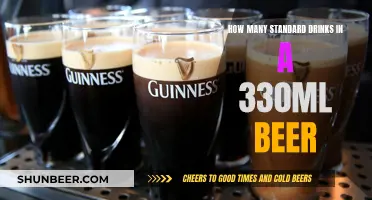
Non-alcoholic beer is often marketed as a safe alternative to alcoholic beer, but it's important to be aware of the potential risks. While non-alcoholic beer typically contains little to no alcohol, it may still possess small amounts, and certain groups should avoid it. For instance, pregnant women and those with a history of alcohol misuse should refrain from drinking non-alcoholic beer due to the potential presence of alcohol and the risk of triggering cravings. However, for those looking to reduce their alcohol intake, non-alcoholic beer can be a good option, as it provides the sensory experience of regular beer without the negative consequences of intoxication.
| Characteristics | Values |
|---|---|
| Alcohol content | Non-alcoholic beer usually contains very little alcohol, but it can include up to 0.5% ABV. |
| Health benefits | It can help with rehydration, sleep, anxiety, and cardiovascular health. It may also reduce the risk of osteoporosis and improve copper metabolism. |
| Calories | Non-alcoholic beer has fewer calories than alcoholic beer, but it may have more calories than water or other soft drinks. |
| Suitability | It is not recommended for people with alcohol addiction, pregnant women, or those trying to conceive. |
| Taste | The taste of non-alcoholic beer has improved over the years, and it now rivals the full-strength version. |
What You'll Learn

Non-alcoholic beer and pregnancy
Non-alcoholic beer is often marketed as a safe alternative for pregnant women, but it's important to be aware of the potential risks involved. While it might seem like a refreshing option during pregnancy, it's crucial to understand the implications for both the mother and the developing baby.
Non-alcoholic beer typically refers to beer with an alcohol-by-volume (ABV) content of less than 0.5%small amount of alcohol can still be present in the final product, and there is limited research on its exact effects during pregnancy. Some studies have shown that these beverages can contain higher ethanol levels than indicated on their labels, with some brands claiming to have 0% alcohol but containing up to 1.8%. As a result, it is generally recommended to avoid non-alcoholic beer altogether during pregnancy to eliminate any potential risks.
The consumption of alcohol during pregnancy can lead to serious complications. It increases the chances of miscarriage, stillbirth, and premature birth. Additionally, it is linked to Fetal Alcohol Spectrum Disorders (FASD), which can cause physical, mental, and behavioural impairments in children exposed to alcohol in the womb. FASD includes conditions such as fetal alcohol syndrome (FAS), which can result in low birth weight, vision and hearing issues, developmental delays, learning and behavioural difficulties, and a higher risk of substance abuse disorders. Given these risks, leading organizations such as the American College of Obstetricians and Gynecologists (ACOG) and the Centers for Disease Control and Prevention (CDC) advise pregnant women to abstain from alcohol consumption entirely.
While non-alcoholic beer might seem like a tempting alternative, it's important to prioritize the health and well-being of the baby. Instead, expectant mothers can explore alternative beverage options such as alcohol-free mocktails, herbal teas, infused water, and fruit juices, which provide hydration and essential vitamins and minerals for a healthy pregnancy.
Ultimately, the decision to consume non-alcoholic beer during pregnancy should be made in consultation with a healthcare provider, who can provide personalized guidance based on individual circumstances. It's always better to be safe than sorry when it comes to the health of both the mother and the baby.
Afib and Alcohol: Is Drinking Beer Safe?
You may want to see also

Non-alcoholic beer and addiction
Non-alcoholic beer is often marketed as a safe alternative to regular beer, but it is important to be aware of the risks before consuming it. While non-alcoholic beer typically contains very little alcohol, it may still possess some small amounts. According to US law, non-alcoholic beers can contain up to 0.5% alcohol by volume (ABV), while products marketed as alcohol-free must contain 0.0% ABV. Despite these requirements, research suggests that many non-alcoholic beers contain more alcohol than their labels indicate.
The potential dangers of non-alcoholic beer are particularly relevant for certain populations, including pregnant people and those with alcohol use problems. For pregnant individuals, it is recommended to avoid any alcohol consumption to prevent the risk of fetal alcohol spectrum disorder (FASD). Even small amounts of alcohol can lead to birth defects, including low body weight, facial abnormalities, physical problems, and neurobehavioral disorders.
For those with alcohol use problems, non-alcoholic beer can pose a risk of triggering cravings and a subsequent relapse. The smell and taste of non-alcoholic beer may be similar enough to regular beer to evoke sensory cues that make individuals want to consume alcoholic beverages. This is supported by a research study in which rats were trained to associate certain smells with alcohol consumption, and the smell was found to increase levels of dopamine, a brain chemical associated with feelings of elation and pleasure. While this was an animal study, it suggests that the sensory cues of non-alcoholic beer may have the potential to trigger cravings in humans as well.
In addition, non-alcoholic beer may contain higher levels of carbohydrates and sugar compared to regular beer, which can lead to weight gain and dental issues if consumed in excess. It is important to be mindful of the sugar content, especially for individuals with diabetes.
While non-alcoholic beer can be a helpful tool for some people to cut down their alcohol consumption, it may not be effective for everyone, especially those with an addiction to alcohol. For individuals in recovery from alcohol use disorder, it is crucial to consult with a healthcare professional or addiction specialist before consuming non-alcoholic beer to assess the potential risks and triggers.
Overall, while non-alcoholic beer can be a healthier alternative to regular beer for some people, it is important to be aware of the potential dangers and to consume it in moderation, especially for individuals with alcohol use problems or specific health conditions.
Beer and Pseudoephedrine: A Safe Mix?
You may want to see also

Non-alcoholic beer and health
Non-alcoholic beer is often marketed as a healthier alternative to regular beer, and it does have several purported health benefits. However, it's important to note that non-alcoholic beer is not completely alcohol-free and may still contain up to 0.5% alcohol by volume (ABV) in some countries. Additionally, it's not a suitable option for everyone, especially those with certain health conditions or those who are pregnant.
Health Benefits of Non-Alcoholic Beer
Non-alcoholic beer is associated with several potential health benefits, including:
- Improved cardiovascular health: Non-alcoholic beer may positively impact cardiovascular health by reducing blood pressure, inflammation, and homocysteine levels. This effect is attributed to the polyphenols present, such as xanthohumol, a compound derived from hops.
- Enhanced sleep quality: The hops in non-alcoholic beer contain compounds like xanthohumol and myrcenol, which have a sedative effect. Studies have shown that consuming non-alcoholic beer in the evening can improve sleep quality, reduce sleep latency (the time it takes to fall asleep), and decrease restlessness during the night.
- Reduced anxiety and stress: Consuming non-alcoholic beer has been found to decrease feelings of anxiety and stress in stressed individuals. Experimental studies have shown that drinking non-alcoholic beer for two weeks led to lower self-reported stress levels and decreased urinary levels of 5-HIAA, a compound associated with anxiety disorders.
- Post-exercise recovery: The sodium, fluids, and carbohydrates in non-alcoholic beer can aid in post-exercise recovery. It helps rehydrate the body and provides essential nutrients to support muscle recovery.
- Improved bone health: Silicon, a component of non-alcoholic beer, may increase bone mineral density and reduce the risk of osteoporosis.
- Better copper metabolism: Non-alcoholic beer contains a component that promotes better copper metabolism, helping to alleviate the symptoms of copper deficiency, such as joint pain, anemia, and weak bones.
- Lactation support: Non-alcoholic beer may stimulate the secretion of prolactin, a hormone that enhances breast milk production. Additionally, it may increase the antioxidant capacity of breast milk and reduce oxidative stress in the mother's body.
Potential Health Concerns with Non-Alcoholic Beer
While non-alcoholic beer has its benefits, there are also some potential health concerns to consider:
- Alcohol content: Despite being labelled as non-alcoholic, these beverages may still contain a small amount of alcohol (up to 0.5% ABV in some cases). This can be problematic for individuals who need to avoid alcohol completely, such as those with alcohol addiction or those taking certain medications.
- Calorie and sugar content: Non-alcoholic beer often contains more calories and sugar than regular beer. While it may be a healthier alternative to regular beer in terms of alcohol content, it may not be the best choice for those looking to reduce their calorie intake.
- Pregnancy: Due to the potential presence of alcohol, non-alcoholic beer is not recommended for pregnant women. Alcohol consumption during pregnancy can lead to fetal alcohol spectrum disorder (FASD) and other birth defects.
- Relapse trigger: The smell and taste of non-alcoholic beer may act as a trigger for individuals recovering from alcohol use disorder. It is essential for those in recovery to avoid any triggers that may lead to a relapse.
Drinking Beer in Liverpool Streets: What's the Law?
You may want to see also

Non-alcoholic beer and calories
Non-alcoholic beer is often marketed as a healthier alternative to alcoholic beer, and while it does have fewer calories, it's important to note that it is not necessarily a low-calorie drink.
Non-alcoholic beer is typically produced by removing the alcohol from regular beer. This process usually involves either heating the beer or filtering it to separate the alcohol from the water. Once the alcohol is removed, the remaining liquid is flattened, so carbon dioxide is added to create carbonation, and sugar is often added to improve the taste. As a result, non-alcoholic beers tend to have a higher carbohydrate content than regular beers, mostly in the form of added sugars.
Alcohol contains 56 calories per unit, or seven calories per gram, so by swapping an alcoholic beer for a non-alcoholic one, you can save up to 145 calories. However, it's important to note that the final calorie count of a non-alcoholic beer depends on its ingredients and the brewing process. For example, a beer made with a lazy yeast is likely to be higher in sugar and calories. Additionally, the NHS recommends that adults consume no more than 30 grams of sugar per day, and it is easy to exceed this limit by drinking non-alcoholic beers, as they can contain up to 10 grams of sugar per 330ml bottle.
While non-alcoholic beers are generally lower in calories than their alcoholic counterparts, they are not always a healthier option. If you are looking to reduce your calorie intake, it is important to be mindful of the sugar content in non-alcoholic beers and opt for low-carb options. Additionally, if you are pregnant or trying to become pregnant, it is best to avoid non-alcoholic beers, as they may still contain small amounts of alcohol that could be harmful to the fetus.
Morning Beer: Should You Drink Before Work?
You may want to see also

Non-alcoholic beer and rehydration
Non-alcoholic beer has been marketed as a recovery drink for athletes, with some brands even suggesting it is optimal for rehydration. But is it?
Non-alcoholic beers contain both water and electrolytes, which are key to rehydration. However, the optimal hydration solution would include a liquid with a 3-4% carbohydrate solution, 180-225 mg of sodium, and 60-75 mg of potassium. While non-alcoholic beers do contain some electrolytes, they are not high enough in sodium. For example, Zero+ Sports Beer contains 71mg of sodium and 113mg of potassium, while Athletic Brewing Company contains 11.3-15mg of sodium and 125mg of potassium. However, if supplemented with a salty meal, these beverages can be effective for rehydration.
Additionally, non-alcoholic beers have been shown to have no diuretic effect, meaning they do not increase urine production levels. This is due to their null effect on circulating vasopressin levels. They also contain mostly water, which assists in rehydration.
In a study led by Johannes Scherr and David Nieman, 277 marathon runners were instructed to drink up to 1.5 litres of either non-alcoholic beer or a placebo for three weeks before the 2009 Munich Marathon and for two weeks after. The study found that when athletes consistently drank non-alcoholic beer, markers of inflammation were down by 20% and there was a lower frequency of infection. Non-alcoholic beer was shown to limit athletes' risk of illness, which is often cited as a reason for inconsistent training.
In another study, Dr. Ben Desbrow crafted a specially formulated reduced-alcohol beer with added electrolytes and tested its effect on fluid balance. The 'light' beer and Desbrow's specially formulated salty, watered-down beer both rehydrated participants better than regular beer.
Overall, while non-alcoholic beer may not be the optimal choice for rehydration, it can certainly aid in the process, especially when supplemented with a salty meal.
Beer and Cipro: Is It Safe to Drink Alcohol?
You may want to see also
Frequently asked questions
No, pregnant women should avoid non-alcoholic beer. While non-alcoholic beer has much less alcohol than regular beer, it may still contain small amounts of alcohol, which can be harmful to the foetus.
No, non-alcoholic beer is not recommended for people recovering from alcoholism. The smell and taste of non-alcoholic beer may trigger cravings and a subsequent relapse.
No, non-alcoholic beer is not a good option for people trying to reduce their calorie intake. It often provides a similar number of calories as regular beer due to its added sugar.
It depends. While non-alcoholic beer contains only trace amounts of alcohol, there has been no research into the effects of drinking it when taking medication. If you're concerned, speak with your doctor.
Yes, non-alcoholic beer won't get you drunk. It contains very little alcohol (up to 0.5% ABV), which is not enough to impair your ability to drive.







